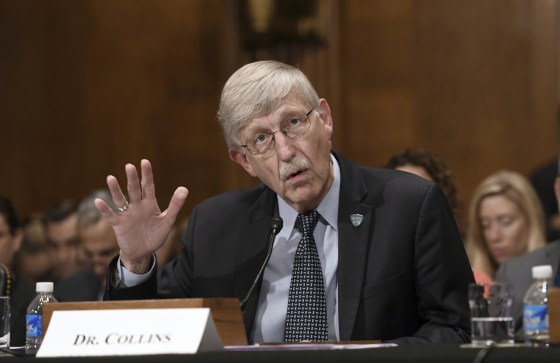One of the most influential public health officials in the world said Wednesday that he will no longer speak on scientific panels if they don't include women.
Dr. Francis Collins, director of the U.S. National Institutes of Health, made the announcement in an online statement during a time when science is in the midst of its own #MeToo movement.
"It is time to end the tradition in science of all-male speaking panels, sometimes wryly referred to as 'manels,'" Collins wrote. "Too often, women and members of other groups underrepresented in science are conspicuously missing in the marquee speaking slots at scientific meetings and other high-level conferences."
"When I consider speaking invitations, I will expect a level playing field, where scientists of all backgrounds are evaluated fairly for speaking opportunities," he wrote. "If that attention to inclusiveness is not evident in the agenda, I will decline to take part."
Those who work to promote gender equality in science and medicine welcomed Collins' statement.
"We as women have a lot of power, but we’re only going to get so far unless we have men who can take a stand as well," said Elizabeth McCullagh, a postdoctoral fellow at the University of Colorado Anschutz Medical Campus.
McCullagh also serves on the leadership board of the group 500 Women Scientists, a group that works to expand diversity in science. The organization represents more than 11,000 women around the world qualified to be on the very panels to which Collins referred.
Collins joins a growing number of scientists who have also promised to decline speaking engagements devoid of female representation. The director of the NIH Office of Research on Women's Health, Dr. Janine Clayton, provided NBC News with a statement that said, in part, "I have pledged to follow his example, and it is my hope that others in the STEM community and beyond will be inspired to do the same."

Just a few weeks ago, the National Academy of Sciences announced that any of its members proven to have engaged in sexual harassment would lose their membership. That action follows a landmark report from the broader group, the National Academies of Sciences, Engineering, and Medicine, that took a deep look at the culture of harassment targeting women in science.
Wednesday's statement is not the first time the NIH director has addressed the topic.
Last September, Collins wrote that sexual harassment is "morally indefensible, it’s unacceptable, and it presents a major obstacle that is keeping women from achieving their rightful place in science — as trainees representing the next generation of innovators, as researchers making important scientific discoveries, and as senior personnel on NIH-supported grants."
The implicationsof such messaging are enormous, as the NIH is the largest source of funding for biomedical research in the world, investing more than $32 billion each year.
Earlier this year, the NIH released a statement apologizing for any role the agency has played in sexual harassment among scientists. "To all those who have endured these experiences, we are sorry that it has taken so long to acknowledge and address the climate and culture that has caused such harm," the statement said.
FOLLOW NBC HEALTH ON TWITTER & FACEBOOK


